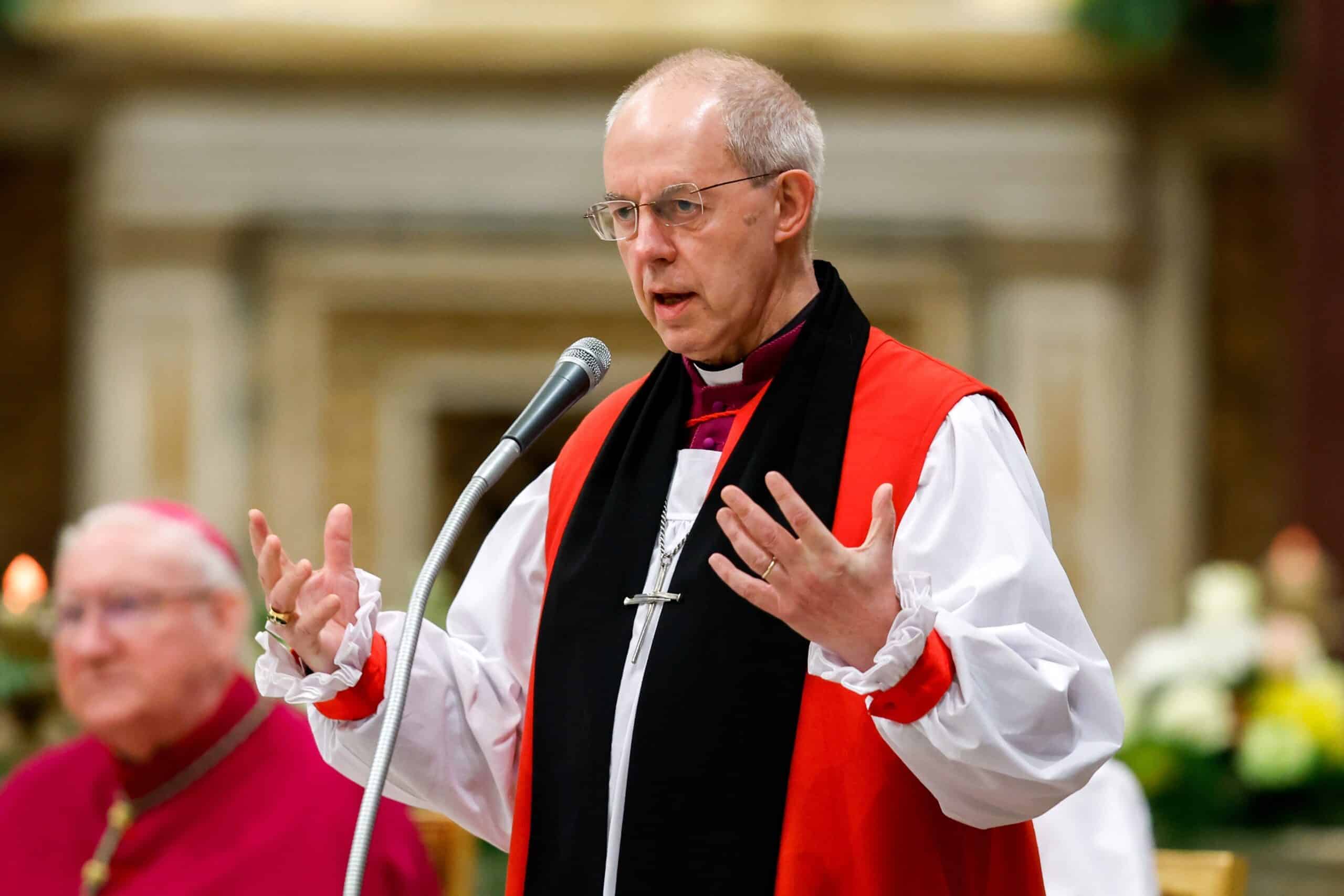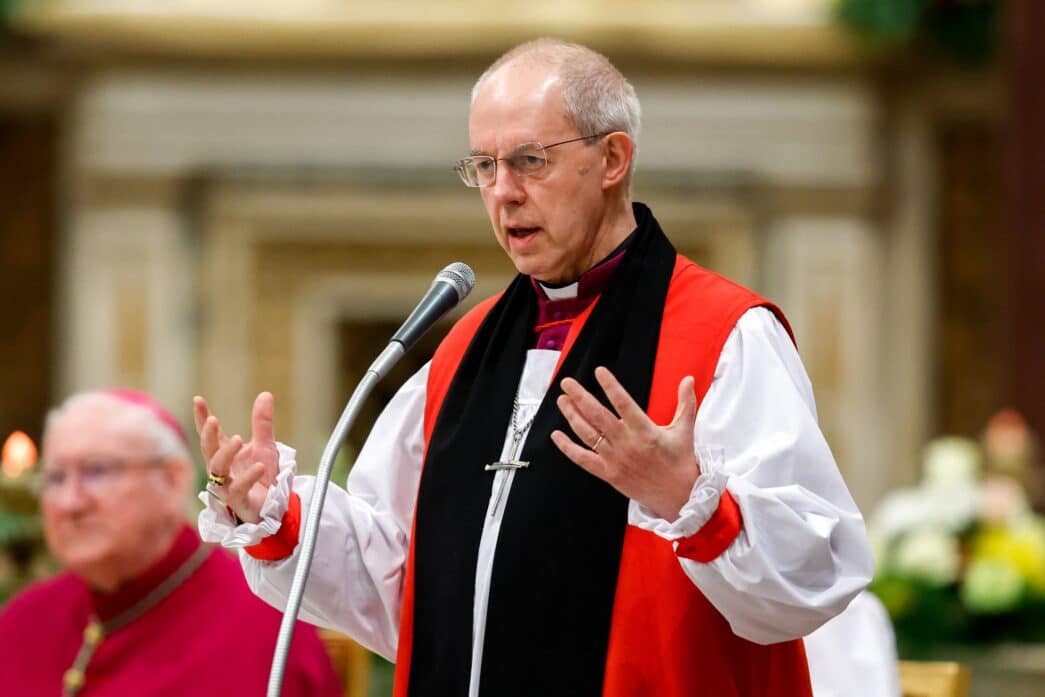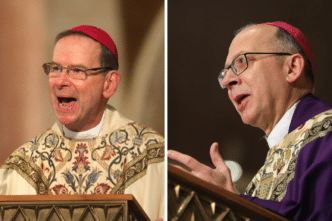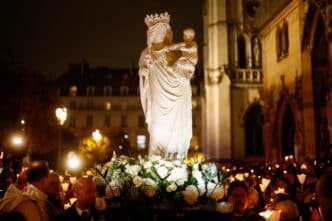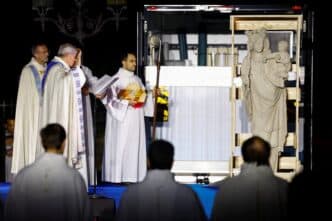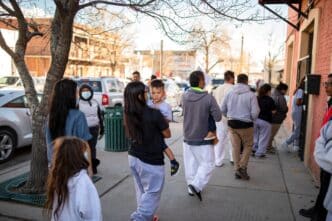Leading British Catholics have urged their church to avoid involvement in the resignation of the Anglican archbishop of Canterbury, who quit Nov. 12 after being implicated in a large-scale abuse cover-up.
“This drama won’t make a vast difference to the many people who already view Christianity negatively — they’ll merely see it as confirming what they already thought,” said Timothy Guile, chairman of the English Catholic History Association.
“While it will hugely damage confidence across the Anglican Communion, it shouldn’t affect the Catholic Church, which should avoid becoming embroiled in any way,” he said.
The Catholic historian was reacting to the resignation of Archbishop Justin Welby, the 105th archbishop of Canterbury, following report findings he was complicit in ignoring crimes by one of his church’s worst known abusers.
Welby’s departure threatens hierarchy
In an OSV News interview, Guile said Archbishop Welby’s departure would “seriously undermine” the Anglican church’s hierarchy, which was already “enormously pressured” by disillusioned Anglicans and media critics, but should not damage morale in Britain’s Catholic Church.
Meanwhile, a top Catholic editor praised the Anglican archbishop for his recent stance on world issues, including conflict in the Middle East, and expressed sympathy for his friends and family.
“This is a huge scalp for the church’s opponents, and a warning to all denominations that we still haven’t done enough to confront abuse and must stay vigilant,” said Josephine Siedlecka, editor of the London-based Independent Catholic News.
“While he’s done the noble thing by resigning, I’m sorry such a thoughtful and open person has had to take such a sad step. This could easily have happened to a Catholic leader too — being implicated in a report on events long past,” she said.
Failure to address sex abuse decades ago
Archbishop Welby, who was the leader of England’s official state church, said he had tendered his resignation to King Charles III after the independent review by safeguarding specialist Keith Makin, published Nov. 7, found he had failed to ensure the reporting of “prolific and abhorrent” physical and sexual abuse by lawyer John Smyth at church-run camps in Britain and southern Africa in the 1970s and 1980s.
According to the independent report, Smyth abused more than 100 boys and young men starting in the 1970s when he was running summer camps as a layman guardian. Accusations include physical, psychological and sexual abuse, and that the Church of England was aware of them as early as in the 1980s but didn’t take steps to prevent further abuse.
The 251-page document argued Archbishop Welby had held “personal and moral responsibility” to pursue the abuse claims “whatever the policies at play at the time required,” and had made “incorrect assertions” about his own awareness of the crimes when they were publicly exposed and investigated by police in 2017.
Pressure from clergy and survivors prompted resignation
Demands for the archbishop to quit came from abuse survivors and members of the church’s General Synod, as well as from prominent clergy and a petition with more than 15,000 signatories.
In his Nov. 12 statement, Archbishop Welby said the Makin review, which also implicates other Anglican bishops, exposed a “long-maintained conspiracy of silence,” adding that he was stepping aside “in the best interests of the Church of England.”
The archbishop said he had “struggled to introduce improvements” to safeguarding over a dozen years as church leader, and hoped his resignation would clarify “how seriously the Church of England understands the need for change.”
The archbishop’s move was praised by several Anglican prelates, including Archbishop Stephen Cottrell of York, the church’s second dignitary, who described it as “right and honourable,” while British premier Keir Starmer told a press conference he also respected the decision.
Speaking Nov. 13, the Church of England’s deputy lead bishop for safeguarding, Bishop Julie Conalty, told the BBC no institution “can ever be totally safe,” adding that it was likely “other people should go.”
In his OSV News interview, historian Guile said many Catholics would view Welby as “an archbishop who undermined Christian teaching on the family and marriage,” in light of recent pronouncements on sexual relations, LGBTQ+ rights and same-sex relationships.
“With his managerial style, he was more a chief executive officer than an archbishop — many decent Anglicans in the pews also had little respect for his leadership,” the Catholic historian said.
“Many thought his departure was inevitable, given his failure to stick by orthodox Christian teaching. The cover-ups and failure to act were a tragic addition to this,” Guile added.
Schisms in the global Anglican Communion
Born in London in 1956, to a mother who was personal secretary to Winston Churchill, Archbishop Welby was ordained an Anglican priest in 1993 after 11 years in the oil industry, rising rapidly from parish work to become dean, bishop and archbishop.
Catherine Pepinster, former editor of The Tablet, a Catholic weekly, said Welby’s own life had featured “turbulence and trauma,” including “alcoholic parents,” the death of a child and long uncertainty over his own biological father.
He was outspoken on issues from poverty and social justice, to the environment and help for refugees, but faced criticism for demanding the closure of churches during the 2020-2021 COVID-19 lockdown, a move blamed for a drastic fall in Anglican weekly church attendance.
He maintained friendly ties with Pope Francis, traveling with him on a “pilgrimage of peace” to South Sudan in 2023, and attending Rome events for Christian Unity in January 2024.
However, he also faced criticism for backing the Church of England’s 2023 decision to offer blessings to same-sex couples, with 10 Anglican archbishops abroad rejecting his honorary position as “first among equals” in the global communion.
No collective statement on the archbishop’s resignation was published by Nov. 13 by the Church of England or Anglican Communion, whose 85 million members in 165 countries have long been divided over social and moral issues, or by the conservative Global South Fellowship of Anglican Churches.
Failure to uphold moral values
Joseph Shaw, chairman of Britain’s Latin Mass Society, told OSV News he believed Christian churches were “fortunate” in being “held up to standards of behavior by the secular media,” whose abuse investigations had in many cases exposed a “seething cauldron of corruption.”
However, he added that the Church of England’s “historic constitutional mandate” to uphold moral values in Britain had been gravely damaged under Archbishop Welby’s leadership.
“Past ecumenical attempts at theological closeness and institutional reconciliation between Catholics and Anglicans have now clearly ended — but we can still be allies in seeking to transform society if we still follow the Gospel,” Shaw said.
“Yet,” he added, “it seems as if no one is taking sexual sin seriously anymore. If we can no longer agree on the Ten Commandments, this will be disastrous for the institutional church, as well as for society.”

